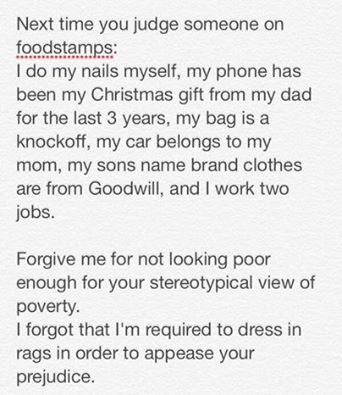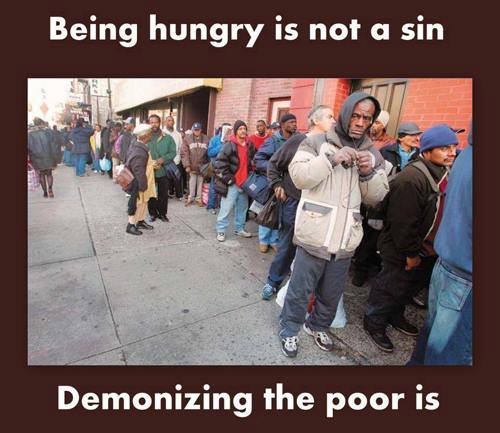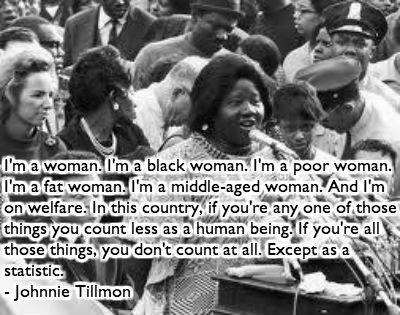Next Time You Judge Someone on Food Stamps, Remember This...
By:
Many Americans are still struggling to keep food on the table after the Great Recession. Right now, 1 in 7 Americans are “food insecure” and approximately 47.4 million are surviving on food stamps, referred to as Supplemental Nutrition Assistance Program (SNAP). That means there’s a strong chance you may know someone living on SNAP or close to needing food assistance.

Are your friends wearing dirty clothes, begging for scraps on the street? I am going to make the assumption they are not. There’s still a heavy stigma attached to the poor and what being in need is supposed to look like. We live in a society that shames poverty and implies that you brought it upon yourself. The Chairman of the House Budget Committee, Paul Ryan, recently typified this notion, saying, "We have got this tailspin of culture, in our inner cities in particular, of men not working and just generations of men not even thinking about working or learning the value and the culture of work, and so there is a real culture problem here that has to be dealt with."
One of the world's richest woman, Gina Rinehart, put it more bluntly in a magazine column: "If you’re jealous of those with more money, don’t just sit there and complain. Do something to make more money yourself — spend less time drinking or smoking and socializing, and more time working."
But one does not simply come out of poverty so easily. According to the Economic Policy Institute, half the jobs in the nation pay under than $34,000 a year. There are many contributing factors that can cause people to be poor. Problems start early with bad nutrition, inequitable public schools, lack of mentors, etc. Regardless of any individual circumstance, no one should feel bad for reaching out for help when in need.

Recently, a few courageous lawmakers took the food stamp challenge, living off SNAP in an attempt to show that hunger is more than just a statistic. As U.S. Congresswoman Jan Schakowsky, who took the challenge, wrote: "All spontaneity is out the window. Feel like buying a cup of coffee? Forget it. Those pretzels in the vending machine look tempting? Keep walking. They’re not in the budget."
"For the week [I took the challenge], I walked as much as I possibly could to avoid paying for transportation, skipped meals to save money — and I ate much smaller and less healthful meals when I did eat," said former Ohio Gov. Ted Strickland.
I didn’t need to take the challenge, I lived it. And I learned a lot from it but mainly that I should never feel ashamed for reaching out for help. I also learned that I had my own stereotype of what being poor should look like. When I had to go to the SNAP office, I admit I was expecting to see the depths of poverty exemplified. Instead, I saw people from all walks of life: young and old, clean and dirty, black and white. I am Ivy League educated, worked for years, had decent savings, and wore nice clothes before times got hard and I lost my job. Besides being a black woman, on paper I didn’t look like my idea of a typical SNAP recipient. Anyone could easily slip into poverty.
Why do we think so poorly of the poor?

Let’s officially kill the stereotype of what a SNAP recipient should look like: the black welfare queens, the lifetime dependents, the drug users, etc. You should not feel alone in your own bias towards the poor. Congress still has the stereotyped image of the fraudulent food stamper engrained in their minds as well. Ignore the fact that 83% who receive SNAP benefits are children, elderly, and people with disabilities. Or that there has been a decline in the number of people enrolled in SNAP. Congress still cut back SNAP benefits last year. Some members even suggested drug testing for recipients.
A major food gap between the rich and the poor exists in our country. Though SNAP helps reduce hunger, by no means does it eliminate it and it certainly doesn’t encourage the purchase of nutritious food.
I would be naive to assume that no one tries to game the system. But that number is estimated to be negligable: 3.4%. Plus it is very difficult to detect fraud in SNAP benefits in the first place. The mistrust of the poor and assumption that most take advantage of the system is detrimental to progress in reforming the system that supports them. As Barbara Ehrenreich, the author of the book Nickeled and Dimed, wisely put it: "Poverty is not a character failing or a lack of motivation. Poverty is a shortage of money." We live in one of the most prosperous countries in the world; it’s a shame that we still struggle with how we treat people in need.
